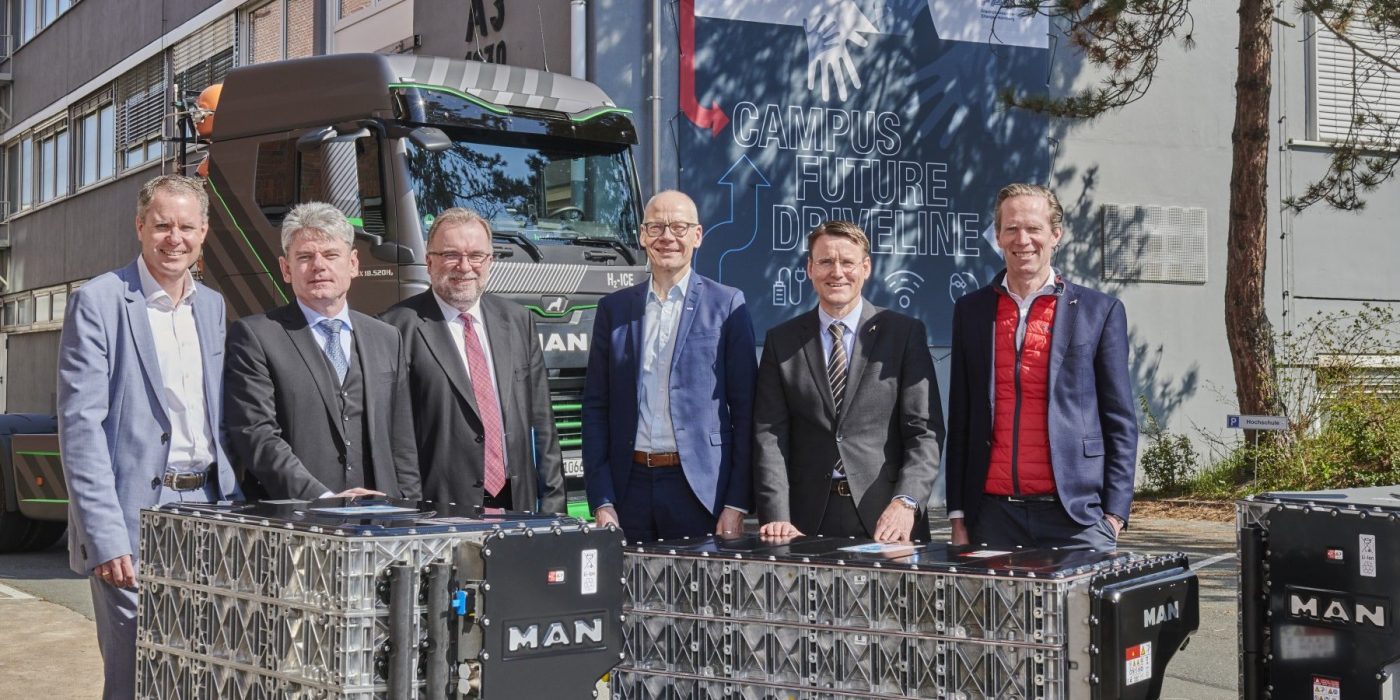MAN strengthens drive technology research initiative
MAN Truck & Bus is strengthening its cooperation with surrounding scientific institutions at its Nuremberg site. Together they want to research “fossil-free, future-proof drives” and create synergies between science and industry.
The cooperation with the Friedrich-Alexander University Erlangen-Nuremberg (FAU) and the Nuremberg University of Applied Sciences Georg Simon Ohm (Ohm) will unfold both decentrally and spatially united on the factory premises of the MAN site in Nuremberg, which is known to be MAN’s traditional production site for combustion engines. In both cases, the cooperation is entitled ‘Campus Future Driveline’. The joint laboratories on the MAN site have now been officially opened. The first Ohm students moved into their workplaces there as early as the summer of 2022. At the beginning of 2022, the conversion of the laboratories was started on-site.
Today, five test benches are in operation at the Traton subsidiary’s site in Nuremberg. According to MAN, a total of eight test benches for batteries and fuel cells as well as a materials laboratory are to be built. “By leasing the space on the Nuremberg factory premises of MAN Truck & Bus to Ohm, the parties involved have succeeded in making particularly sustainable use of existing resources, because Ohm had already been looking for new space for its students for some time,” the trio informs us. And: “The symbiotic use of the space vacated by MAN in buildings A3, A5 and A8 represents a win-win situation. Before the Campus Future Driveline moved in, MAN’s premises were used for the development of natural gas and diesel engines.”
In addition to the joint use of specialised test benches and measuring facilities, the trio also aims to create a pool of ideas for common goals and work packages, as well as to push teaching and further education within the framework of lectures and teaching modules.
The first joint projects of the Campus Future Driveline are already underway. For example, FAU wrote the technical lecture “Hydrogen” for the MAN Academy, an internal further education institution. A basic training course developed by Ohm on the subject of “hydrogen and fuel cells” has also already gone live. In the field of fuel cells, the research project ‘Fuel-Cell System Heavy Duty’ (FAU), the establishment of an energy laboratory in the project NFLUID (Ohm) as well as SMART.H2 (Ohm) have also been started. The BNG 2.0 project (TH Nuremberg), which has already begun, is concerned with the further development of battery technology.
“For MAN Truck & Bus, the campus here in Nuremberg is another milestone in the transformation of this tradition-rich site. This is where the most efficient diesel engines were and are already being created, and this is where the most economical battery packs, fuel cells and electric engines will be developed and produced for our customers in the future with scientific support,” said Alexander Vlaskamp, CEO of MAN Truck & Bus.
According to Niels Oberbeck, President of the Georg Simon Ohm University of Applied Sciences, application-oriented research can not only successfully help shape the transformation that is so important for the region, but also further develop teaching: “Our students gain insights into content and new technologies that would not be possible without the interaction of companies, university and university.”
Joachim Hornegger, President of FAU, adds that close cooperation between science and industry is essential for transport transformation. “At FAU, scientists have played a decisive role in shaping research in the field of innovative transport technologies in recent years, just as students are dealing with the topic in various degree programmes. The Campus Future Driveline now brings three important partners in the region, MAN, FAU and THN, even closer together.”
It has been public since the middle of last year that MAN Truck & Bus will be manufacturing high-voltage batteries for e-trucks and e-buses in large-scale production in Nuremberg from the beginning of 2025. The company plans to invest around 100 million euros in this over the next five years. The Bavarian Ministry of Economic Affairs is funding the project with around 30 million euros.
With reporting by Cora Werwitzke, France.





0 Comments